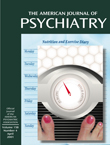Dialectical Behavior Therapy for Bulimia Nervosa
Abstract
OBJECTIVE: The effects of dialectical behavior therapy adapted for the treatment of binge/purge behaviors were examined. METHOD: Thirty-one women (averaging at least one binge/purge episode per week) were randomly assigned to 20 weeks of dialectical behavior therapy or 20 weeks of a waiting-list comparison condition. The manual-based dialectical behavior therapy focused on training in emotion regulation skills. RESULTS: An intent-to-treat analysis showed highly significant decreases in binge/purge behavior with dialectical behavior therapy compared to the waiting-list condition. No significant group differences were found on any of the secondary measures. CONCLUSIONS: The use of dialectical behavior therapy adapted for treatment of bulimia nervosa was associated with a promising decrease in binge/purge behaviors.



